
Top Gambling Statistics UK
- 48% of UK adults took part in gambling in a month, according to a 2024 survey.
- Gambling participation was highest among adults aged 25-64, with 62% to 66% of people in this age group engaging in gambling.
- 63% of men participated in gambling, compared to 58% of women.
- The National Lottery is the most popular form of gambling, with 31% of people in the UK taking part in draws.
- 38% of people in Great Britain engaged in some form of online gambling in a month.
- Around 2.5% of UK adults (roughly 1 in 40 people) are struggling with a gambling problem.
What Percentage Of People Gamble In The UK?
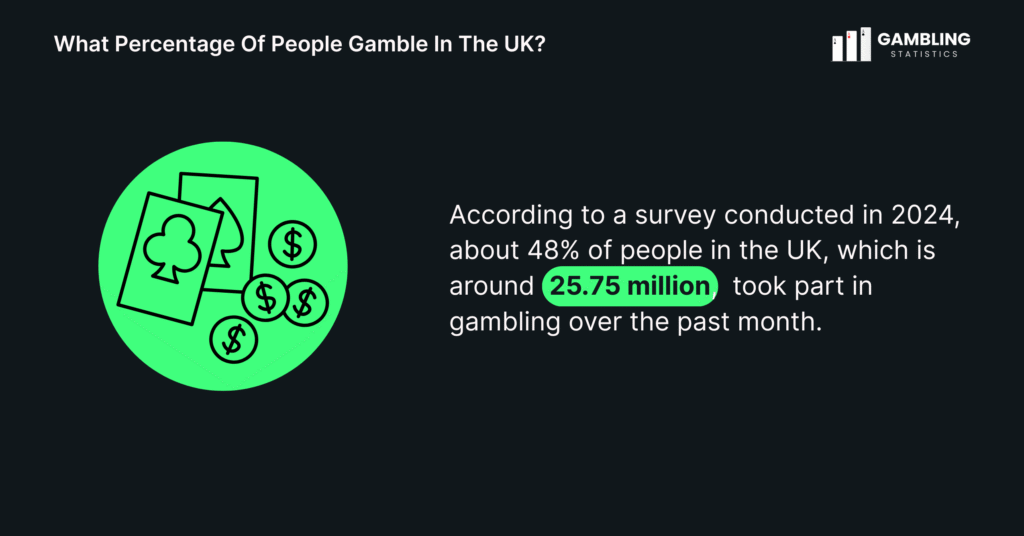
According to a survey conducted in 2024, about 48% of people in the UK, which is around 25.75 million, took part in gambling over the past month.
More people gamble online (37%) than in person (29%), but a lot of the online gambling is from buying lottery tickets. When we remove lottery tickets, 18% of people gambled in person, while 15% did so online.
On average, people who gambled in the last month took part in about 2.3 different activities. The most common activities were the National Lottery (31%), charity lottery tickets (16%), and scratchcards (13%).
Source: Gambling Commission
Demographics Of Gamblers In the United Kingdom
The demographics of gamblers in the United Kingdom show who is more likely to engage in gambling, highlighting factors like age, gender, and other key characteristics. Let’s take a closer look at the demographics that are more likely to gamble in the United States
What Is The Legal Age For Gambling In The UK?
In the UK, the legal age for gambling is 18.
This is outlined in the Gambling Act 2005, which states that it is illegal for anyone under 18 to enter a licensed gambling premises. This law is designed to protect children and young people from the risks associated with gambling.
Source: Wikipedia, Gambling Commission.
Gamblers In UK By Age
Gambling activity in the past 12 months was highest among adults aged 25-64, with participation rates ranging between 62% and 66%.
Participation dropped significantly among those aged 18-24 (54%) and 75+ (50%). This indicates that younger adults (18-24) and older adults (75+) are less likely to engage in gambling activities compared to the middle-aged groups.
When looking specifically at gambling activities other than lottery draws, the highest participation rates were found among those aged 25-44. 52% of those aged 25-34 and 50% of those aged 35-44 gambled on activities other than lottery draws.
Participation then decreased with age, dropping to just 19% for those aged 75 and over. As people age, their involvement in gambling activities other than lottery draws declines, with the most significant drop seen in the 75+ age group.
Source: Gambling Commission. (Please note that the information presented is based on data from the year 2023.)
According to data recorded for 4 weeks in 2023, people in the 45-64 age group are the most likely to participate in gambling, with 53% to 54% of them taking part in gambling activities, including lottery draws.
The highest participation rate is observed in the 55-64 age group, at 54%.
For 18-34-year-olds, 34% engage in gambling activities other than lottery draws. However, this number drops significantly for older age groups, with just 16% of those aged 65-74 and only 13% for those aged 75 and above.
The 18-24 group has the lowest overall gambling participation, at 38%, but their involvement in non-lottery gambling activities is higher, at 34%. This suggests that younger people might be more selective about the types of gambling they engage in.
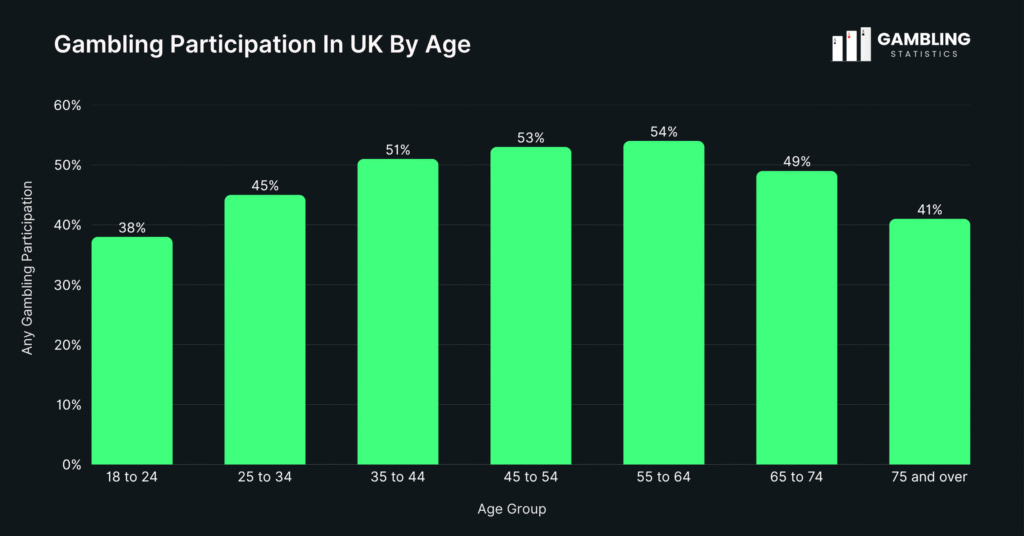
Here is a table displaying Gambling Participation in the Past Four Weeks (by Age Group) recorded in 2023
| Age Group | Any Gambling Participation (Including Lottery Draws) | Gambling Participation Excluding Lottery Draws Only |
|---|---|---|
| 18 to 24 | 38% | 34% |
| 25 to 34 | 45% | 34% |
| 35 to 44 | 51% | 34% |
| 45 to 54 | 53% | 29% |
| 55 to 64 | 54% | 24% |
| 65 to 74 | 49% | 16% |
| 75 and over | 41% | 13% |
Source: Gambling Commission. (Please note that the information presented is based on data from the year 2023.)
Gamblers In the UK By Gender
63% of males participated in gambling activities, compared to 58% of females.
This highlights that gambling is slightly more common among men compared to women.
A similar trend is observed when excluding lottery draws. 42% of males engaged in gambling activities other than lottery draws, while 39% of females did the same.
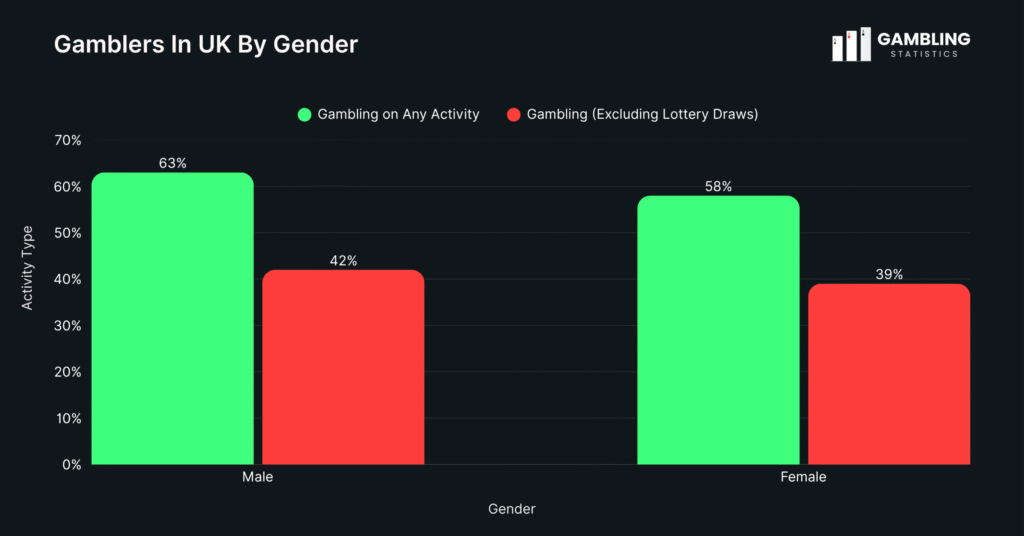
Here is a table displaying the share of gamblers in the United Kingdom by their gender (2023):
| Gender | Gambling on Any Activity | Gambling (Excluding Lottery Draws) |
|---|---|---|
| Male | 63% | 42% |
| Female | 58% | 39% |
Source: Gambling Commission. (Please note that the information presented is based on data from the year 2023.)
Types Of Gambling Statistics
Around 31% of people in the UK take part in National Lottery draws, making it the most popular form of gambling across the country.
Other forms of lottery are also quite common, with 16% of the population playing in charity or other lottery draws.
When it comes to scratchcards, 13% of people said they bought one in the past month, while 9% placed bets, either online or in person.
This shows that while the National Lottery dominates, a significant portion of the population also engages in other gambling activities.
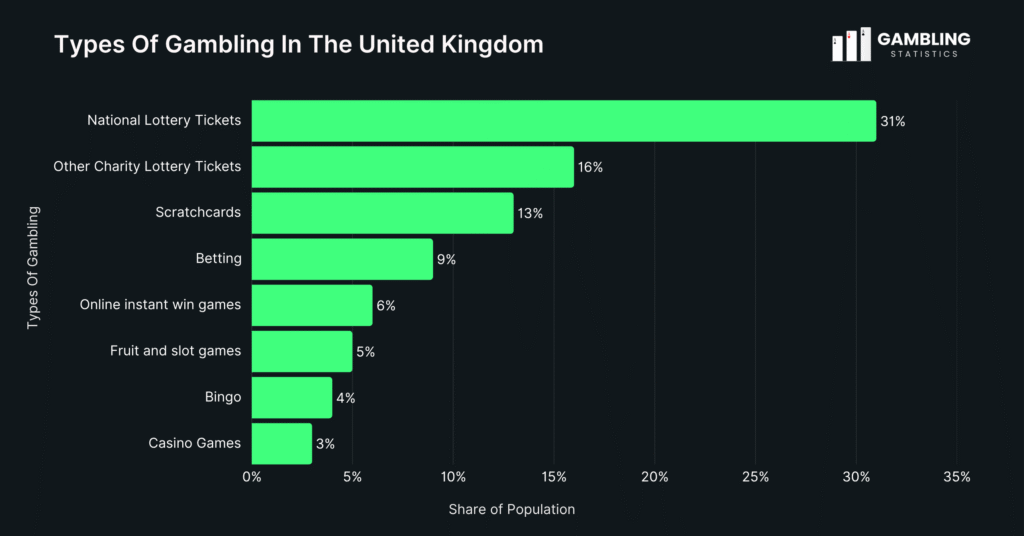
Here is a table displaying the types of gambling in the United Kingdom:
| Types Of Gambling | Share of Population |
|---|---|
| National Lottery Tickets | 31% |
| Other Charity Lottery Tickets | 16% |
| Scratchcards | 13% |
| Betting | 9% |
| Online instant win games | 6% |
| Fruit and slot games | 5% |
| Bingo | 4% |
| Casino Games | 3% |
Source: Finder
Online Gambling Statistics UK
38% of the people in Great Britain have taken part in some form of online gambling in the past four weeks of the survey.
The majority of online gamblers participate in national lottery draws, accounting for 26% of British adults. Meanwhile, 8% participated in online betting, and another 8% participated in sports betting.
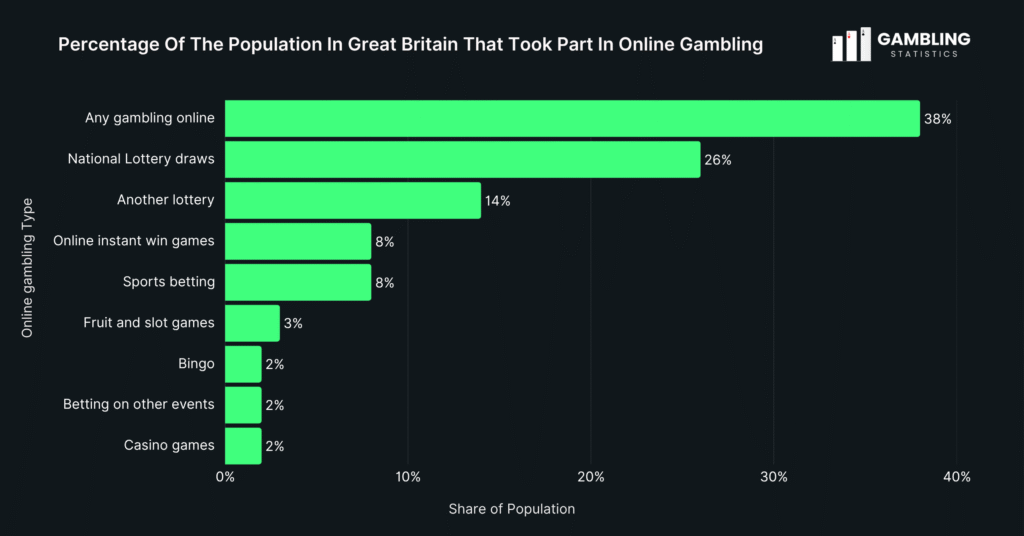
Here is a table displaying the share percentage of the population in Great Britain that took part in online gambling by gambling type.
| Online gambling Type | Share of Population |
|---|---|
| Any gambling online | 38% |
| National Lottery draws | 26% |
| Another lottery | 14% |
| Online instant win games | 8% |
| Sports betting | 8% |
| Fruit and slot games | 3% |
| Bingo | 2% |
| Betting on other events | 2% |
| Casino games | 2% |
Source: Statista
The highest share of online gambling participation is seen in the 55 to 64 and 45 to 54 age groups, with 42% each.
At the same time, the 65 to 74 group also shows significant participation, at 37%.
The lowest participation is seen among people aged 18 to 24, just 24% of the people in this age group participated in online gambling.
The following table displays the share of the population in different age groups that participated in gambling in the past 4 weeks of the survey conducted:
| Age Group | Share of population |
|---|---|
| 18 to 24 | 24% |
| 25 to 34 | 31% |
| 35 to 44 | 29% |
| 45 to 54 | 42% |
| 55 to 64 | 42% |
| 65 to 74 | 37% |
| 75 plus | 32% |
Source: Statista
Reasons For Gambling In UK
In the United Kingdom, 86% of people who gamble say they do it for the chance to win big money.
At the same time, 7 out of 10 gamblers mention that they gamble simply because they find it fun.
Money-making is another strong motivation — about 58% of gamblers believe it helps them earn extra cash, while 55% say they do it because it’s exciting.
Beyond money and excitement, 27% of people view gambling as a hobby or pastime, and 22% say they gamble as a way to relax.
Overall, the reasons behind gambling in the UK show a mix of thrill, enjoyment, financial hopes, and leisure.
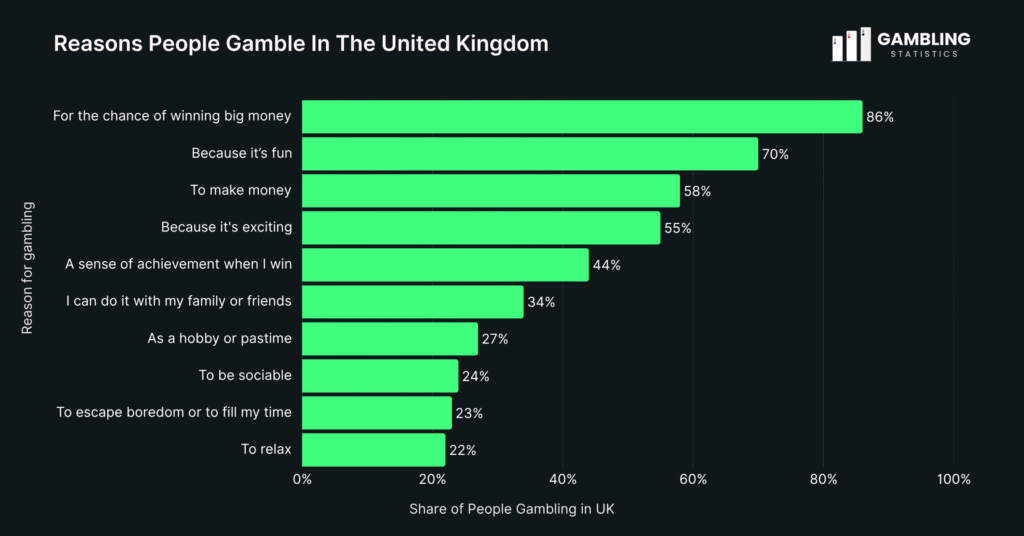
Here is a table displaying the reasons people gamble in the United Kingdom:
| Reason for gambling | Share of People Gambling in UK |
|---|---|
| For the chance of winning big money | 86% |
| Because it’s fun | 70% |
| To make money | 58% |
| Because it’s exciting | 55% |
| A sense of achievement when I win | 44% |
| I can do it with my family or friends | 34% |
| As a hobby or pastime | 27% |
| To be sociable | 24% |
| To escape boredom or to fill my time | 23% |
| To relax | 22% |
Source: Finder
Problem Gambling In UK
Approximately 2.5% of people in the United Kingdom, which is roughly 1 in 40 adults, are dealing with a gambling problem.
In addition, 3.7% are considered moderate-risk gamblers. These are individuals who may not currently have a gambling issue but are at risk of developing one if their habits continue or increase.
The Problem Gambling Severity Index (PGSI) is the tool used to assess gambling behaviour. A score of 8 or more on the PGSI indicates problem gambling, while a score between 3 and 7 suggests moderate risk.
The consequences of a gambling problem can be serious, as nearly three-quarters (76%) of problem gamblers say they’ve had to dip into savings or borrow money because of their gambling.
Source: The Guardian, Finder.
Gambling Industry In the United Kingdom
The gambling industry in the UK is projected to generate a massive $28.86 billion in revenue by 2025.
Looking ahead, the market is expected to grow steadily at an annual rate of 2.87%, reaching a total value of $32.31 billion by 2029.
The casino and casino games sector alone is predicted to hit $15.31 billion in 2025, highlighting its strong contribution to the overall market.
On average, each user in the UK gambling market is expected to spend around $1,280 in 2025. At the same time, the number of users is forecasted to grow to 24.3 million.
By 2025, around one-third of the UK population (33.1%) is expected to be actively participating in the gambling market, showing just how widespread gambling has become.
Source: Statista
Impact Of Gambling On Mental & Physical Health
People with gambling problems often experience substance use disorders, impulse-control issues, mood disorders, and anxiety disorders. Here are some statistics that highlight the impact of gambling on the mental and physical health of gamblers.
- Around 4% of people receiving treatment for substance abuse also struggle with a gambling disorder.
- The condition is even more common among psychiatric inpatients, with nearly 7% affected, and it also impacts up to 7% of people living with Parkinson’s disease.
- An estimated 96% of people who struggle with gambling also have at least one other mental health condition.
- 37% of individuals with problem gambling and 49% of those with a pathological gambling disorder experience suicidal thoughts.
- 17% of problem gamblers and 18% of individuals with a gambling disorder have attempted suicide.
Source: American Psychological Association, Behaviour Health News,
Conclusion: Nearly Half Of The Adults In The United Kingdom Gamble
48% of adults in the UK, or around 25.75 million people, have engaged in gambling over a month, according to the survey data in 2024.
The National Lottery stands out as the most popular form of gambling, with 31% of the population engaging in lottery draws. Online gambling is also on the rise, with 38% of people in Great Britain taking part in some form of online gambling.
2.5% of UK adults, or 1 in 40 people, are dealing with gambling problems. This highlights a significant concern, as 76% of problem gamblers report having to use savings or borrow money because of their gambling.
